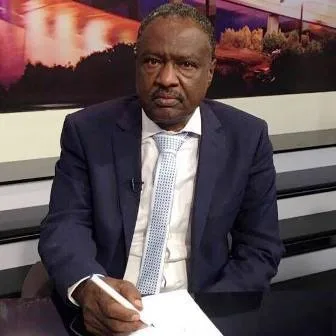The Speech of Rebellion

By Rashid Abdel Rahim
(“Either al-Burhan hands it over, or we take it from him”)—this was Hemedti speaking to Al-Hadath TV on the very first day of the war.
He began his most recent speech by greeting the uncles and elders of the tribal chiefs, saluting the martyrs, and promising to provide the wounded with everything they need.
(“Abdel Rahim gave his people fifty vehicles during the battle, while we, the Salamat, got only one vehicle after joining the Derishka fight.”)
Thus, the rebellion’s rhetoric has descended into talk about the dead, the wounded, the uncles and cousins, and the distribution of vehicles—after it had once been all threats and bravado, like “hand over power without evasion”, or warnings about marching on Shendi, and threats to the Shaigiya and the people of al-Dabba.
The rebellion has ended up with nothing but Hemedti’s lies and his desperate attempts to keep his forces together in their final battles—offering only repeated promises to the wounded, promises he has never fulfilled.
The Rapid Support Forces’ voice has fallen silent since their spokesmen fled. Baqqal, who once threatened Yasir al-Atta, saying he would storm his house, has himself fled Sudan. Even their supposed capital, Nyala, is no longer safe for him, after his group vanished and no one knows the whereabouts of Captain Sufyan Barima, or where Fadel al-Jubouri and Omar Jibril have escaped to.
The RSF’s tongue has been cut off—just as its mind, its capacity to think, plan, and rescue itself from its sliding defeat, has vanished. Each day in the battles of El Fasher, it loses dozens more fighters.
The Rapid Support Forces have become like a raging bull—attacking unthinkingly, without purpose or strategy.
It no longer has a thinking mind, and its top military commander is now Abdel Rahim Dagalo, a former sergeant in the Armed Forces.
The rebellion has ended up forming formless, hollow entities such as the so-called “Government of Foundation”, whose primary purpose is to serve as a platform for Hemedti to indulge in his favourite pastime—lying, gossiping, and chattering about people in petty, trivial ways.
This “government” is headed by al-Taiechi, the man with the bicycle, and includes a mix of failures and opportunists—from Ibrahim al-Mirghani to Hagar and others like them.
The tribal leaders of Darfur have fallen silent, even as they watch their sons and kin die daily—for no cause, with no hope of victory.
The Rizeigat, Misseriya, Salamat, and Habbaniya tribes now seem devoid of men able to defend their people and their honour. They no longer have the strength to stand up to a power-hungry man who has lost all the territories he once seized outside Darfur—and now Darfur itself awaits its turn to be cleansed of his forces and freed from the grip of rebellion.
It is as if the Misseriya, Rizeigat, Habbaniya, Salamat, Hawazma, and Fellata no longer have men of wisdom and knowledge—elders of tribal chiefs, educated men, lawyers, judges, teachers (past and present), poets, and women of song—capable of confronting what is being done to them.
Hemedti and his backers have tried every means of bribery and seduction, within and outside Sudan—but his market is no longer profitable, and his money is no longer enough to buy soldiers or politicians.
Today, the Armed Forces and their allied units face only the remnants of fighters who fled from the northern battles—led by politicians who serve Hemedti’s pocket and his “juzlanah” (booty), not Darfur and its people.
Shortlink: https://sudanhorizon.com/?p=8004

